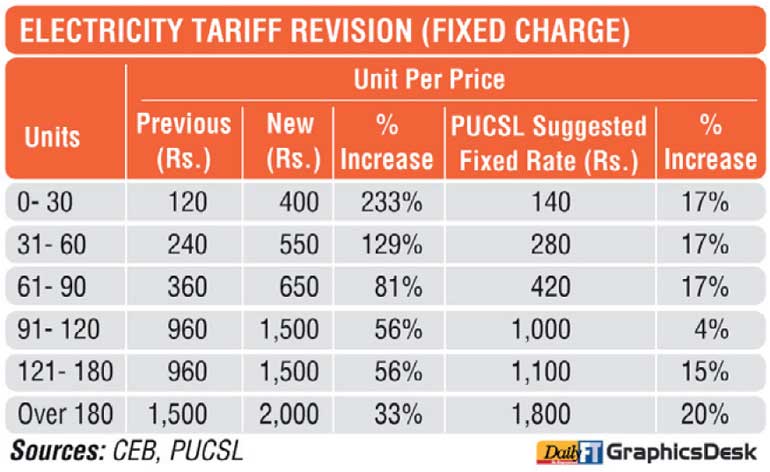Saturday Feb 21, 2026
Saturday Feb 21, 2026
Friday, 17 February 2023 01:38 - - {{hitsCtrl.values.hits}}
By Charumini de Silva
 The Government yesterday announced that an uninterrupted power supply will be provided countrywide upon the approval for higher electricity tariff revision by the Public Utilities Commission of Sri Lanka (PUCSL).
The Government yesterday announced that an uninterrupted power supply will be provided countrywide upon the approval for higher electricity tariff revision by the Public Utilities Commission of Sri Lanka (PUCSL).
President Ranil Wickremesinghe yesterday issued a directive to Power and Energy Minister Kanchana Wijesekera and relevant CEB officials to ensure an uninterrupted power supply for electricity users. He was also instructed to provide concessions for low-income families and provide solar rooftop systems for religious places and State educational institutions.
Holding a special media briefing separately, Minister Wijesekera said the decision to hike tariff by 66% to earn Rs. 288 billion was not to cover retrospective losses of the Ceylon Electricity Board (CEB), but only to cover the operational cost of it.
“The earnings of the CEB were always less than what was required. This vicious cycle made CEB resort to credit facilities instead of cash purchases. With the ever-increasing costs and interest rates, CEB needed to opt for an upwardly revised tariff hike to cover operational costs,” he pointed out.
Minister Wijesekera also said in obtaining the financial bailout from the International Monetary Board, the Government had a special condition that the CEB, Ceylon Petroleum Corporation (CPC) and SriLankan Airlines should not be provided with fund support either from the Treasury or the Central Bank from 1 January 2023, adding that they had no other option than increasing electricity tariffs.
He also stated that already the State banks have agreed to provide necessary credit facilities to purchase fuel from the CPC, whilst adding that the Bank of Ceylon (BOC) also agreed to provide an extra loan of Rs. 22 billion to purchase coal, with the approval being granted for the electricity tariff revision on Wednesday (15).
“I have also instructed the CEB not to rely completely on the CPC to obtain fuel necessary for power generation and to bring down fuel directly if required,” he added.
Given the high-interest rates, the Minister noted that the CEB had to pay over Rs. 10 billion a month for interest rate payments for banks.
He said the full outcome of the latest electricity hike will only be observed by the last week of March or in the first week of April.

Minister Wijesekera said through this new income-generating mechanism, the Government is aiming to open up more opportunities for the renewable energy sector.
“If we cannot pay for the renewable energy suppliers, there will be no new entrants keen to enter the industry. The amount to be settled for renewable energy suppliers for the past year is Rs. 40 billion. Therefore, we are making the right environment for these new renewable energy players to come into play,” he explained.
He also noted that tariffs will be revised every six months in January and July to assess if it needs to be further revised upwards or downwards. “By July, we will be able to see the actual outcome of the electricity tariff revision,” he pointed out.
In response to the criticism of CEB’s productivity and financial management, he said measures have already been taken to boost efficiency and would see them come into play.